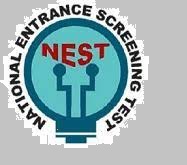NEST MSc Program Test Syllabus 2022 : nestexam.in
Organisation : National Institute of Science Education & Research
Exam Name : NEST MSc Program Test 2022
Announcement : NEST MSc Program Test Syllabus
Website : https://nestexam.in/
What is NEST MSc Program Test?
NEST is a national level entrance test. It is organized to provide admission into the 5-year integrated M.Sc. course in the basic sciences such as Physics, Chemistry, Biology & Mathematics. The entrance test will be conducted for admission to the NISER, Bhubaneswar & UM-DAE-CEBS, Mumbai. As per the NEST 2022 eligibility criteria, c&idates should have completed their class 10+2 with a minimum aggregate of 60% from Science stream. They also must have qualified the last qualifying examination in 2020 or 2021.

Syllabus For NEST MSc Program Test
The syllabus for NEST 2022 primarily follows the NCERT/CBSE science syllabus of class XI–XI.
Biology:
Cell Biology: Cell theory & cells as units of life. Basic concepts of biomolecules – Proteins,
Carbohydrates, Lipids, Nucleic acids. Tools & techniques of cell studies – use of
microscope & calibration (microscopy), elements of microscope. Biomembranes –
transport mechanism, cellular respiration. Cell organelles – structure & functions.
Discovery & structure of DNA, processes of replication, transcription, genetic code &
translation. Principles of the basic techniques in molecular biology. Enzymes– catalysis,
kinetics, activation energy, competitive & non– competitive inhibition.
Genetics & Evolution: Fundamentals of genetics & evolution. Evidences & theories
of organic evolution. Organization of the heredity material in chromosomes. Equational
division. Reduction division. Mitosis & meiosis compared & contrasted. Significance of
meiosis. Mendel’s laws of inheritance. Discovery of linkage, sex–linked inheritance.
Crossing– over, stage at which crossing– over occurs. Neurospora genetics. Mutation –
discovery, types of Mutation & Mutations in diploids. Role of mutations in evolution.
Elaboration of Mendel’s laws of inheritance. Monohybrid or Dihybrid crosses. Human
genetics – human chromosomes, sex–determination, sex–linked inheritance.
Ecology: Physical & biological factors in influencing organisms. Food chains, pyramids of
numbers & biomass. Biological equilibrium. Interspecific associations. Bio–diversity. Flora
& fauna. Basics of microbial systems, Ecosystems.
Humans & Environment: Soil, rainfall & temperature with reference to natural
resources. Our natural resources – their uses & abuses. Environmental pollution &
preventive measures. Biodiversity & conservation.
Biotechnology: Principles of recombinant DNA technology. Applications of biotechnology.
Biology of Animal systems:
Digestive System – Modes of nutrition. Different vitamin compounds & their deficiencies.
Structure of alimentary canal & associated gl&s, digestive enzymes &
gastrointestinal hormones. Absorption of products of digestion, peristalsis, balanced diet.
Respiratory System – Gaseous exchange in animals. Structure of respiratory organs,
mechanism of breathing, gaseous transport, tissue respiration.
Circulatory System – Open & closed systems. Functions of blood & 1ymph.
Microscopic structure of blood & blood vessels. Structures & working of heart.
Distribution of arteries & veins. Circulation of blood coagulation. Blood groups.
Excretory System – Elimination of nitrogenous waste. Osmoconformers &
osmoregulators. Structure & function of kidney tubules. Arrangement of excretory
organs.
Chemistry:
Physical Chemistry:
Measurements in chemistry – SI units for fundamental quantities, significant figures in
calculations.
Mole concept – Avogadro number & mole concept, molar masses, mole fraction,
molarity, molality, percent composition, stoichiometry. Equivalent weight & normality.
Calculations based on mole concept & stoichiometry of different reactions. Oxidation–
reduction reactions.
Gaseous & liquid states – Absolute scale of temperature. Gas laws, ideal gas equation,
real gases & deviation from ideality, liquefaction of gases, van der Waals equation.
Kinetic theory of gases; average, root mean square & most probable velocities &
their relation with temperature. Law of partial pressures. Vapour pressure. Diffusion of
gases.
Atomic structure & chemical bonding – Bohr model, spectrum of hydrogen atom,
quantum numbers. Wave particle duality, de Broglie hypothesis. Uncertainty principle.
Orbitals & quantum numbers; shapes & energy of s, p & d orbitals. Electronic
configurations of elements (up to atomic number 36), filling of orbitals – Aufbau principle.
Mathematics:
Algebra:
Algebra of complex numbers, addition, multiplication, conjugation, polar representation,
properties of modulus & principal argument, triangle inequality, cube roots of unity,
geometric interpretations.
Quadratic equations with real coefficients, relations between roots & coefficients,
formation of quadratic equations with given roots, symmetric functions of roots.
Arithmetic, geometric & harmonic progressions, arithmetic, geometric & harmonic
means, sums of finite arithmetic & geometric progressions, infinite geometric series, sums
of squares & cubes of the first n natural numbers.
Logarithms & their properties.
Permutations & combinations, Binomial theorem for positive integral index, properties of
binomial coefficients. Matrices as a rectangular array of real numbers, equality of
matrices, addition, multiplication by a scalar & product of matrices, transpose of a
matrix, determinant of a square matrix of order up to three, inverse of a square matrix of
order up to three, properties of these matrix operations, diagonal, symmetric &
skew–symmetric matrices & their properties, solutions of simultaneous linear equations in
two or three variables.
Addition & multiplication rules of probability, conditional probability, Bayes Theorem,
independence of events, computation of probability of events using permutations &
combinations.
Trigonometry:
Trigonometric functions, their periodicity & graphs, addition & subtraction formulae,
formulae involving multiple & sub–multiple angles, general solution of trigonometric
equations.
Relations between sides & angles of a triangle, sine rule, cosine rule, half–angle formula
& the area of a triangle, inverse trigonometric functions (principal value only).

Physics:
General: Units & dimensions, dimensional analysis, least count, significant figures.
Methods of measurement (Direct, Indirect, Null) & measurement of length, time, mass,
temperature, potential difference, current & resistance.
Design of some simple experiments, such as: i) Searle’s method to determine Young’s
modulus, ii) determination of ‘g’ by simple pendulum, iii) speed of sound using resonance
tube, iv) coefficient of friction using angle of repose, v) determination of focal length of a
convex lens by plotting a graph between ‘u’ & ‘v’, vi) refractive index of material of
prism using the method of minimum deviation, vii) verification of Ohm’s law, viii) resistance
of galvanometer using half deflection method, ix) specific heat of a liquid using
calorimeter, x) I–V characteristic curve for p–n junction in forward & reverse bias.
Graphical representation & interpretation of data. Errors in the measurements & error
analysis. Mechanics: Kinematics in one & two dimensions (Cartesian coordinates only),
projectiles. Uniform circular motion. Relative velocity. Newton’s laws of motion. Inertial &
uniformly accelerated (linear only) frames of reference. Static & dynamic friction.
Kinetic & potential energy. Linear & circular simple harmonic motion. Work &
power. Conservation of linear momentum & mechanical energy.
Systems of particles. Centre of mass & its motion. Centre of gravity. Impulse. Elastic &
inelastic collisions.
Law of gravitation. Centripetal acceleration & centrifugal force. Gravitational potential
& field. Acceleration due to gravity. Motion of planets & satellites in circular orbits.
Escape velocity
Important Dates of NEST MSc Program Exam
The Important Dates of NEST MSc Program are given below,
Exam Date : 18 June 2022
Admit Card Available : 07 June 2022 (Hours of examination: 9:00 AM – 12:30 PM & 2:30 PM – 6:00 PM)
Announcement of results on NEST website: July 05, 2022